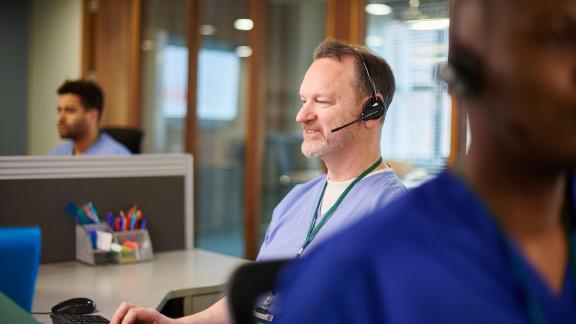Route 2 pathway: from healthcare support worker to registered nurse

University Hospital Dorset NHS Trust developed the Route 2 pathway for existing internationally educated nurses (IENs) in health care support worker (HCSW) roles, helping them to take part in a fast-tracked Objective Structured Clinical Examination (OSCE) course to support them with becoming a registered nurse here in the UK.
Key benefits and outcomes
- HCSWs joining the Route 2 pathway are more engaged and willing to learn.
- In the last 12 months, all eight nurses who have joined the programme have successfully passed their OSCE exams.
- Of the last cohort, 100 per cent of the nurses are continuing their career development at University Hospitals Dorset.
What the organisation faced
University Hospital Dorset has been undertaking international recruitment since 2020 and had a high intake of international recruits joining as HCSWs. Many of the international recruits were from outside of Europe, including the Philippines, India and countries from across Africa and Australia. Once the HCSWs had been in post, some contacted clinical leaders within their team sharing that they would be interested in becoming a registered nurse and had previous experience in their home countries. However, at the time, the trust didn’t have a programme in place which meant that these staff members were preparing for the OSCE exam on their own time using their own funds, which for some nurses would take years.
What the organisation did
In 2021 the trust began to develop the Route 2 pathway. This allowed the HCSWs who had shared an interest in becoming a registered nurse and were already employed by the trust with previous experience to join a fast-track course to become a registered nurse.
Before the HCSWs can join the programme, they need to provide evidence of their experience as a nurse, their English language, nursing certificates from their home countries, and that they have started their Nursing and Midwifery Council (NMC) application. The HCSWs also require approval from their clinical leaders and matrons, due to the OSCE training taking place during work time. The request to join the programme and inform their clinical leaders needs to be done in advance to allow their team time to update rotas due to them being removed from shifts to complete the OSCE training.
Once they join the Route 2 pathway, they move from either a band 2 or band 3 position to band 4 position and begin their OSCE training. Initially, the programme ran for three months with reduced practice hours to allow the candidates to continue working. However, in 2023, they adapted the course to be an intensive four-week training programme. After completing the four weeks of training the candidates sit their OSCE exam. Upon passing the OSCE exam, they will continue to be a band 4, but will have the opportunity to apply for band 5 roles and above. The trust encourages newly trained nurses to apply for the band 5 roles as they will follow the normal recruitment process offered by the trust.
The trust pays for the first attempt of the OSCE exam and half of the second attempt. If the second attempt is due to a partial fail, this is fully covered by the half funding due to the individual only requiring a partial resit.
Results and benefits
From February 2023 to January 2024, the trust trained eight internationally educated HCSWs to become registered nurses. All eight of the nurses passed the OSCE on either the first or second attempt, with seven of them successfully receiving their PIN. All seven of the nurses who have received their PIN are now a band 5 and are continuing to work at University Hospital Dorset, with one awaiting their PIN from the NMC.
The trust currently has eleven requests in the pipeline with two who ready to join the next cohort for OSCE training. They are in contact with the remaining staff members to obtain the required evidence to proceed with the training.
Overcoming obstacles
One of the challenges has been ensuring that the staff are prepared for the training and exam, as they are taking part in a fast-tracked course and are already employed by the trust. The trust also found that when the HCSWs were joining the programme, it impacted their existing teams as they were no longer be working on the wards and the teams lost a member of staff.
One of the trust’s biggest concerns was how well the HCSWs would adapt. Some of the staff members had years of experience in their home country but had also spent many years in the UK already as a HCSW in a different environment. However, the trust found that because the staff members approached their management team asking to become a registered nurse, they were more willing to learn and spend the time practicing.
The uptake has become higher since the Supporting Information from Employers (SIFE) process has been introduced and individuals without English language are requesting to join the programme. However, part of the requirement to join the programme is that individuals need to already have their English language, therefore the trust is not able to take these requests forward. Individuals who have had their SIFE request completed prior to requesting to join the pathway are reviewed as normal.
Next steps
The trust has managed to secure 40 positions for overseas applications this financial year. It expects that a number of these candidates coming to work at the trust (after being in role) will request to join the Route 2 pathway and is preparing for the next cohort.
Top tips
- If your organisation is starting the international recruitment process, learn from each other’s cultures and have an open-minded approach.
- Be organised, as there are many steps that need to be followed in a precise order.
- Have a team with different skills and who can support and guide emotionally as well as practically and make sure pastoral support are involved.
- Ask for feedback from anyone involved in the programme. Review the feedback and the programme on a regular basis. This will allow you to understand how to improve for the next cohort.
- Try not to lose sight of your international staff once they finish their training or programme. You can see if they need any additional support while in the clinical areas; approaching the departments, is for them one of the most stressful and difficult moments.
Contact details
Giuseppe Dell'Avvocato, Giuseppe.Dell'avvocato@uhd.nhs.uk, senior clinical educator/blended education and training, University Hospitals Dorset NHS Trust.
Join our free NHS Employers international recruitment network to connect with colleagues across the NHS, network and share good practice.



